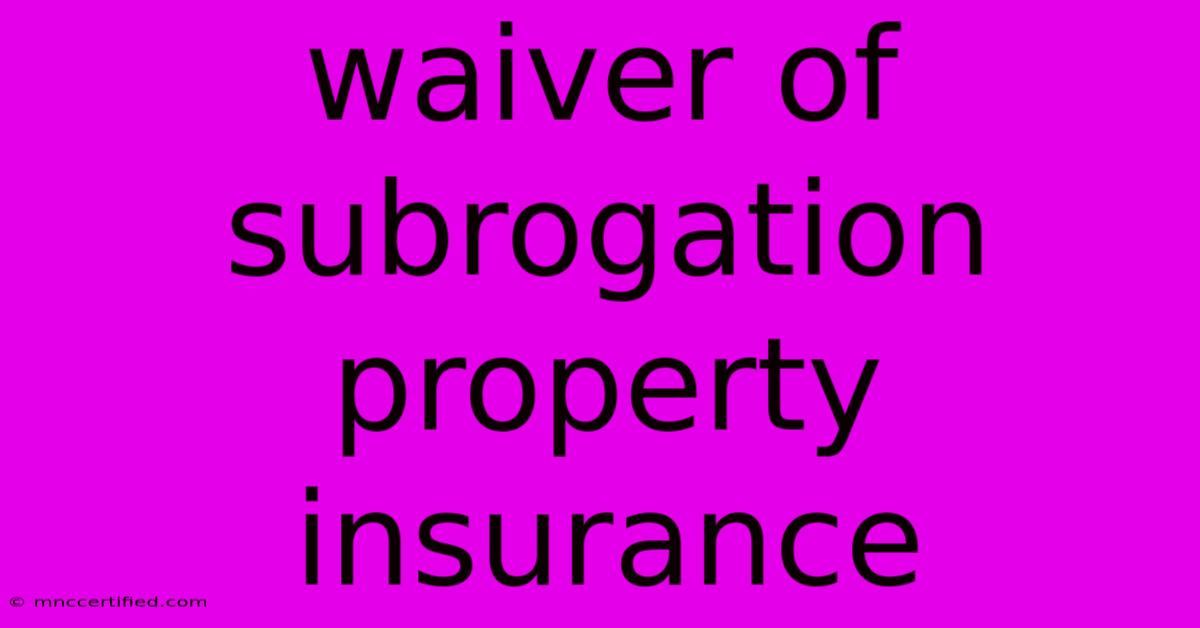Waiver Of Subrogation Property Insurance

Table of Contents
Understanding Waiver of Subrogation in Property Insurance: Protecting Your Assets
When you purchase property insurance, you expect it to protect your assets in case of damage or loss. But what happens if the damage is caused by a third party? This is where the concept of waiver of subrogation comes into play.
In essence, waiver of subrogation is a provision in your property insurance policy that prevents your insurance company from seeking reimbursement from a third party who may have caused the damage. This means that if a third party is responsible for a covered loss, your insurance company will pay you for the claim without trying to recover the money from the responsible party.
Why is Waiver of Subrogation Important?
Let's break down the benefits of including a waiver of subrogation clause in your policy:
- Protection from lawsuits: By waiving its right to subrogate, your insurance company agrees not to sue the responsible party for the loss. This protects you from potential lawsuits by the insurance company, which could be financially and emotionally draining.
- Maintaining good relationships: A waiver of subrogation can help maintain positive relationships with your neighbors, contractors, or other parties involved. It prevents a potentially contentious situation where your insurance company may pursue legal action against someone you know.
- Smooth claim process: By eliminating the need for subrogation, the claims process can become significantly simpler and faster. You won't have to deal with the added complexity of legal proceedings.
When is Waiver of Subrogation Essential?
Waiver of subrogation is particularly valuable in situations where you have a shared responsibility for the property you're insuring, such as:
- Condominium owners: In a condominium association, each owner has their own insurance policy, but the building itself is also insured. Waiver of subrogation ensures that your insurance company won't sue a neighbor if their negligence causes damage to the common areas of the building.
- Commercial property: In commercial settings, where multiple tenants may be involved, a waiver of subrogation clause is crucial to prevent legal disputes between tenants and their respective insurance companies.
- Construction projects: During construction, there are often multiple parties involved, such as contractors, subcontractors, and suppliers. Waiver of subrogation protects each party from potential legal actions by other parties' insurance companies.
Considerations and Limitations
While waiver of subrogation offers valuable protection, it's important to understand its limitations:
- Not always automatic: Waiver of subrogation is not always included in standard property insurance policies. You may need to request it as an addendum or pay an additional premium for this coverage.
- Not a guarantee of no liability: Even with a waiver of subrogation, you might still be held personally liable for damages if you are found to have caused the damage.
- Limited to specific situations: The coverage provided by waiver of subrogation might be limited to certain types of claims, like those arising from negligence. You should carefully review the terms of your policy to understand the specific limitations.
How to Get Waiver of Subrogation
To ensure you have waiver of subrogation in your property insurance policy, take these steps:
- Review your policy: Carefully read the terms and conditions of your current property insurance policy to determine if it includes this provision.
- Contact your insurance agent: Discuss the importance of waiver of subrogation with your insurance agent and inquire about the availability of this coverage as an addendum to your existing policy.
- Compare quotes: When purchasing a new property insurance policy, compare quotes from multiple insurance providers to ensure you're getting the best coverage for your needs at a competitive price.
Waiver of subrogation is a valuable feature for property insurance that can help protect you from financial and legal risks. By understanding its benefits and limitations, you can ensure you have the right coverage to safeguard your assets. Always consult with your insurance agent to ensure you are properly protected.

Thank you for visiting our website wich cover about Waiver Of Subrogation Property Insurance. We hope the information provided has been useful to you. Feel free to contact us if you have any questions or need further assistance. See you next time and dont miss to bookmark.
Featured Posts
-
National Family Assurance Life Insurance
Nov 08, 2024
-
Joint Legal Custody And Health Insurance
Nov 08, 2024
-
Germanys Merz Presses For Topic Timeline Shift
Nov 08, 2024
-
Naturopathic Doctor Covered By Insurance
Nov 08, 2024
-
Certified Cash Flow Insurance Specialist
Nov 08, 2024